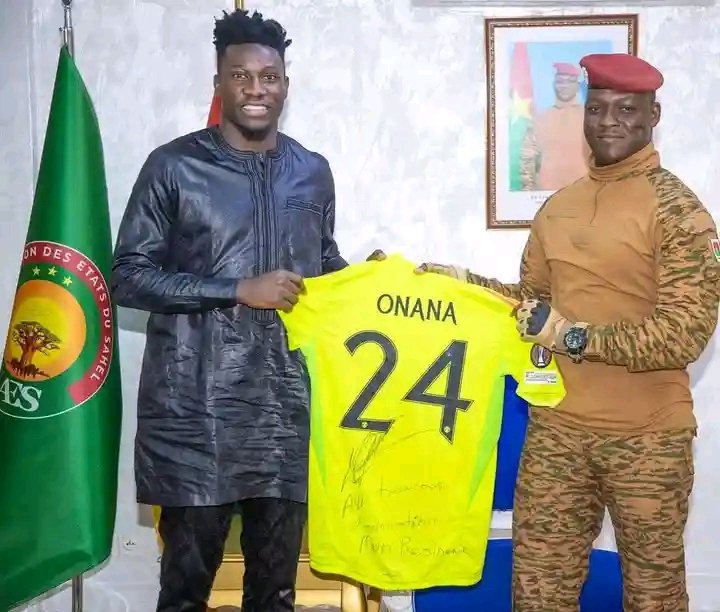In a powerful moment that highlights the intersection of sports, diplomacy, and African unity, Cameroonian goalkeeper André Onana was recently seen with President Ibrahim Traoré of Burkina Faso. The meeting between the two figures resonated far beyond the borders of their respective nations, representing a shared vision of empowerment, solidarity, and progress for Africa’s youth.
André Onana, known globally for his elite goalkeeping skills and charismatic presence on and off the pitch, has become more than just a sportsman. He is a symbol of perseverance, excellence, and African pride. His journey from the streets of Nkol Ngok in Cameroon to the stadiums of Europe, where he has played for clubs like Ajax, Inter Milan, and Manchester United, serves as an inspiration for millions of young Africans aspiring to greatness. His encounter with President Traoré — one of Africa’s youngest leaders and a figure known for his bold vision of Pan-African progress — was emblematic of a broader movement uniting sports, politics, and national development.
President Ibrahim Traoré, who came to power in 2022 amid a wave of national reforms and calls for sovereignty, has positioned himself as a champion of African self-determination. His leadership in Burkina Faso has garnered attention across the continent, especially among younger generations, for promoting policies aimed at economic independence, cultural pride, and resistance against neocolonial influences. His meeting with Onana was not merely ceremonial — it reflected a mutual respect between two trailblazers who are using their respective platforms to inspire and lead change.
During their time together, Onana and Traoré reportedly discussed the role of sports in national development, particularly how football can be a tool for unity, economic growth, and youth empowerment. Onana expressed admiration for Burkina Faso’s resilience and determination, while also emphasizing the need for greater investment in sports infrastructure across Africa. The goalkeeper has long been an advocate for better facilities, training academies, and support for African talent at the grassroots level, and his words echoed a broader sentiment shared by many athletes from the continent.
The visit also symbolized regional solidarity in West and Central Africa — a coming together of minds across national lines to uplift a shared African identity. Images of the two figures shaking hands, smiling, and engaging in discussion quickly went viral on social media, celebrated by fans and political observers alike. The warm reception Onana received in Ouagadougou reflected the admiration he commands not only as an athlete but also as an ambassador of African excellence.
In a time where Africa is increasingly asserting its place on the global stage, meetings like this between cultural and political icons serve as reminders of the power of collaboration. André Onana’s visit to Burkina Faso and his interaction with President Ibrahim Traoré is more than just a footnote in sports diplomacy — it is a powerful testament to what can be achieved when leaders in different arenas work toward a common goal: the upliftment of Africa and its people.

